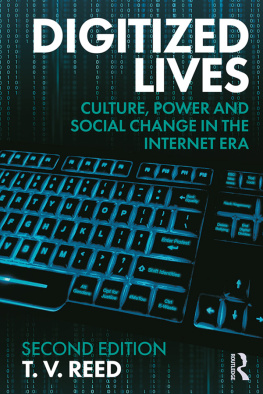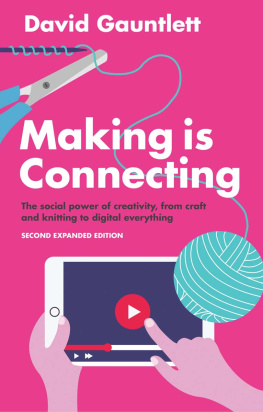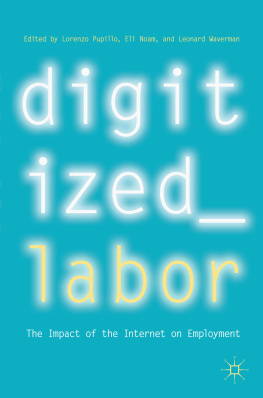Digitized Lives
In chapters examining a broad range of issuesincluding sexuality, politics, education, race, gender relations, the environment and social protest movementsDigitized Lives argues that making sense of digitized culture means looking past the glossy surface of techno gear to ask deeper questions about how we can utilize technology to create a more socially, politically and economically just world. This second edition includes important updates on mobile and social media, examining how new platforms and devices have altered how we interact with digital technologies in an allegedly post-truth era.
A companion website (www.culturalpolitics.net/digital_cultures) includes links to online articles and useful websites, as well as a bibliography of offline resources, and more.
T. V. Reed is Buchanan Distinguished Professor Emeritus of American Studies and English at Washington State University. He is the author of The Art of Protest: Culture and Activism from the Civil Rights Movement to the Present.
Digitized Lives
Culture, Power and Social Change in the Internet Era
Second Edition
T. V. Reed

Second edition published 2019
by Routledge
711 Third Avenue, New York, NY 10017
and by Routledge
2 Park Square, Milton Park, Abingdon, Oxon OX14 4RN
Routledge is an imprint of the Taylor & Francis Group, an informa business
2019 Thomas Vernon Reed
The right of Thomas Vernon Reed to be identified as the author of this work has been asserted by him in accordance with sections 77 and 78 of the Copyright, Designs and Patents Act 1988.
All rights reserved. No part of this book may be reprinted or reproduced or utilised in any form or by any electronic, mechanical, or other means, now known or hereafter invented, including photocopying and recording, or in any information storage or retrieval system, without permission in writing from the publishers.
Trademark notice: Product or corporate names may be trademarks or registered trademarks, and are used only for identification and explanation without intent to infringe.
First edition published by Routledge 2014
Library of Congress Cataloging-in-Publication Data
Names: Reed, T. V. (Thomas Vernon), author.
Title: Digitized lives : culture, power, and social change in the internet era / T.V. Reed.
Description: Second Edition. | New York : Routledge, 2019. | Revised edition of the authors Digitized lives, 2014. | Includes bibliographical references and index.
Identifiers: LCCN 2018032050 | ISBN 9781138309531 (hardback) | ISBN 9781138309548 (pbk.) | ISBN 9781315143415 (e-book)
Subjects: LCSH: InternetSocial aspects. | Information technologySocial aspects. | Social change.
Classification: LCC HM851 .R4336 2019 | DDC 302.23/1dc23
LC record available at https://lccn.loc.gov/2018032050
ISBN: 978-1-138-30953-1 (hbk)
ISBN: 978-1-138-30954-8 (pbk)
ISBN: 978-1-315-14341-5 (ebk)
Typeset in Stone Serif
by Apex CoVantage, LLC
Contents

Figures

Table
Have you been tweeted, blogged, YouTubed, Snapchatted, Instagrammed, Kindled, interacted, texted, sexted, crowdsourced and socially networked to the edge of your sanity? Are you tired of being told that digital technology will solve all the worlds problems, or that it is bringing an end to civilization? Do you want to make common sense of all this digital stuff without the hype, the paranoia or the jargon? Then maybe this book is for you.
There are many books that promise to tell all about the Internet and new communication technologies. Most fall into one of three categories. The most common type is the how to book that provides step-by-step ways to use the technology. While these tend to go out of date quickly, they can be useful, even when they call their readers dummies. The second type is written in a form close to a rant by people either so enamored of or so afraid of new technologies that they profoundly exaggerate their positive or negative impact. The third type of book is written by experts who generally tell way more than most of us want to know about a small aspect of these new media technologies in a language that seems to have come from another planet (the planet Geek, to be precise, a planet I love and visit frequently, but do not live on). Only this third category is relevant to my aims in this book. Many of these works by experts are very important, and this book would not exist without them. But they are not for everybody. They are aimed at a fairly exclusive community of scholars and advanced communication students, not the rest of us.
This book is different. What I hope to do is provide a framework for readers to think about questions such as: Why use these technologies at all? If we do use them, how much use is good for us? And within those broad questions, more pointed ones, such as what are new media doing to our brains, to our sex lives, to our parentchild interactions, to our politics, to our education system, to our identities as individuals and as community members? In other words, how do these new technologies fit into the bigger picture of society and culture in the twenty-first century? This book is less interested in programs, apps and devices that come and go in the blip of a computer screen than in asking, in as clear and jargon free a way as I can, some enduring questions about what we can and should make of these technologies, about how we can take control of them rather than have them control us.
We all sense that the Internet and the ever-changing array of new digital hardware and software are changing the world, and changing us. But most of us arent so sure what those changes are, and whether they are for the better or for the worse. Indeed, anyone who tells you they do know for sure what those changes mean is probably about as reliable as that email from the complete stranger who wants you to help him transfer his million dollars into your bank account. From the dawn of the Internet era, there has been a duel between the technophobes and the technophiles, the haters and the lovers of tech. Right at the dawn of the Net era in the early 1990s this exaggerated procon debate took off with books such as Neil Postmans relentlessly pessimistic Technopoly (1993), answered by Nicholas Negropontes relentlessly optimistic Being Digital (1995). Avoiding these two speculative extremes that have been repeated often in the subsequent two decades of Internet life, this book seeks to examine some of what is actually going on in digitized spaces, noting both the dangers and the pleasures involved. Part of that work is recognizing that the digitizing world is only part of the world, surrounded by political, economic and social forces that shape what happens online more than the technology itself.
For many of the more than 3 billion of us now taking part in the digitized life (about one-half of the worlds population), asking these questions is like a fish trying to think about water. We take that water for granted. Its just where we live. But just as the quality of water is vital to a fishs health, so too is it vital for us to think about the quality of digital culture, to try to sort out the healthy from the polluted or the toxic waterways, to try to make things a little less murky, a little more transparent.







